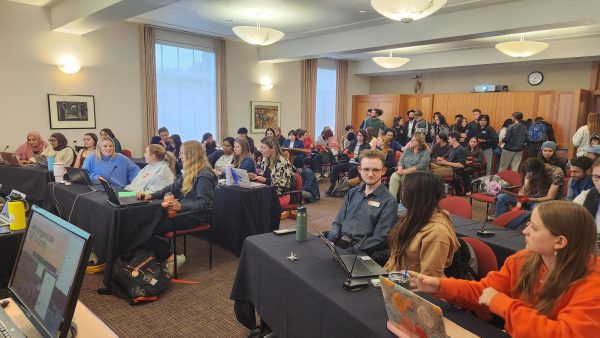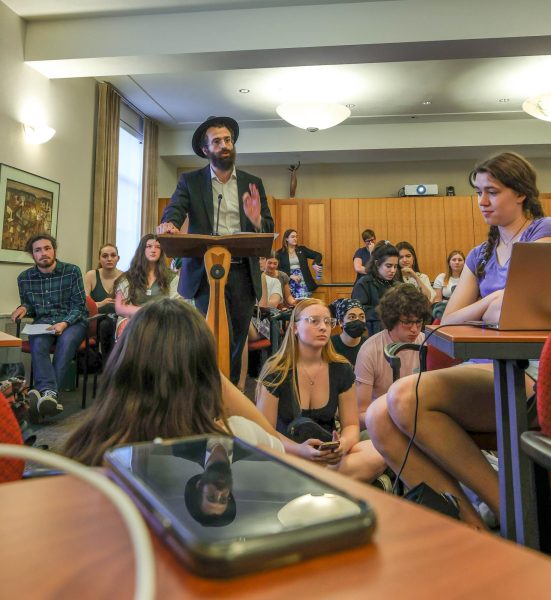$4.8 million awarded to OSU, supporting student scholarships in cybersecurity
A $4.8 Million donation to OSU’s Cybersecurity program was made to help students continue to earn degrees in the field. This illustration depicts funding for protection on computers and sensitive information.
February 6, 2023
Students studying cybersecurity at Oregon State University will be eligible to apply for a full ride scholarship starting next year.
Thanks to the National Science Foundation’s Scholarship for Service program, the cybersecurity program at OSU received a $4.8 million federal grant, most of which will be translated into 29 full-ride scholarships for computer science students.
OSU is the first institution in the state to be awarded money from CyberCorps, a program that provides scholarships for undergraduate and graduate cybersecurity education through the NSF.
The grant will be doled out over a five year period – undergraduates selected from an application process will receive a full scholarship that covers tuition and fees and a $24,000 stipend to cover living expenses each year, beginning in the 2023-24 academic year – and comes after a proposal was submitted by OSU to the NSF in fall 2022, and awarded in December said Dave Nevin, an assistant professor of practice in cybersecurity in the school of electrical engineering and computer science.
“A program director from NSF came out for a pre-award site visit, and one of the first things that he commented on was that he didn’t realize that OSU was so big,” Nevin said. “It’s a big investment on their (NSF’s) behalf, and a lot of their concern (was if) the university would have the numbers of students to support that; and so they got to see firsthand that we really do have a large population of students in our cybersecurity program.”
The SFS has a stipulation however, requiring those who receive the scholarship to work in government cybersecurity upon graduation for the same number of years they receive the scholarship.
Cameron McCawley, the president of the OSU Security Club, a nationally-recognized cybersecurity club, and a fourth-year computer science undergraduate, believes the grant is a wonderful opportunity for students who want to pursue cybersecurity as a career.
“By providing this sort of scholarship for service where people can get the knowledge they need about this field, and then go directly into the workforce and get experience, is super useful,” McCawley said.
In addition to receiving an annual stipend, undergraduate students in this program will receive $6,000 for travel to attend a job fair in Washington D.C. each year as well as other expenses, Nevin said.
Graduate students in cybersecurity are also eligible for the scholarship, but Nevin did not have specific figures for them.
Nevin added that about $800,000 from the NSF was given to support OSU’s CyberClinic, a facility on campus that gives students interested in cybersecurity hands-on experience.
“We set up the (CyberClinic) here… that is staffed by students in our cybersecurity program and they do that as part of their degree program,” Nevin said. “It’s like a teaching hospital for cybersecurity.”
McCawley is currently earning credit at the CyberClinc in place of his senior capstone.
“The money going towards the CyberClinic as well is great, because that is probably the most hands-on experience and the most accurate experience you’re going to get compared to working in an actual role as a security analyst,” McCawley said.
As of now, the city of Tualatin and the Open Source Labs at OSU are clients of the CyberClinic, McCawley said.
Nevin and Rakesh Bobba, an associate professor at OSU focusing on cybersecurity, are co-leads at the CyberClinic, and will be a part of the team that will look over scholarship applications for the cybersecurity grant.
The NSF SFS program is not new however, just new to OSU.
“When they’re picking schools for this award, they’re looking for innovation in cybersecurity and also the strength of the program… They really appreciated our CyberClinic program,” Bobba said.
Nevin said that the CyberClinic was made with the intention for students to receive credit as well as gain job experience during their time at OSU.
“We did a study of the pay for (cybersecurity) jobs,” Nevin said. “With just a degree, the average (salary) is probably around $60,000 a year with no experience… but if you have a year of experience that bounces that up closer to $100,000; having that year of experience is worth about $40,000 for the students.”
As the cybersecurity program at OSU grows, Nevin stresses how large of a job market there is for cybersecurity.
The total available job openings in cybersecurity amount to 755,743 in the United States, 7,425 of which are in Oregon alone, according to the Cyber Seek website.
“As long as there are organizations, they’re going to need cybersecurity people,” McCawley said. “Organizations need someone there that can help protect their data, their assets, their customers… I don’t see that (need) going away anytime soon, and I think it’s just going to continue to grow.”
























































































































